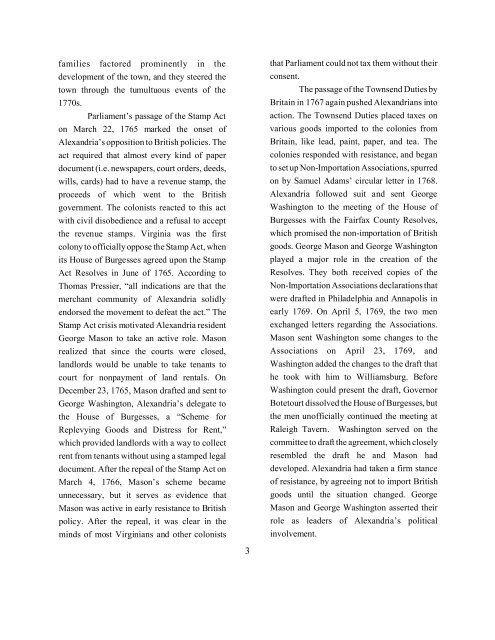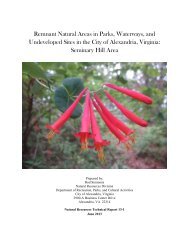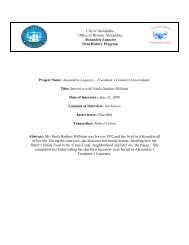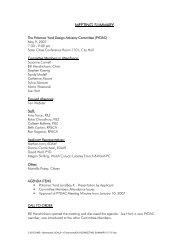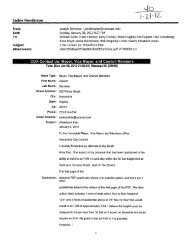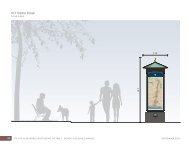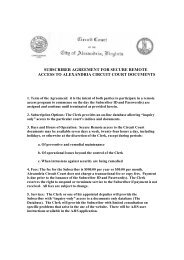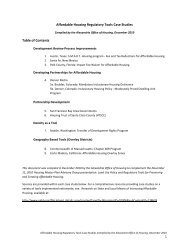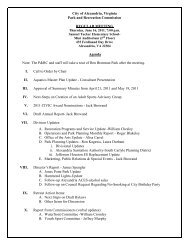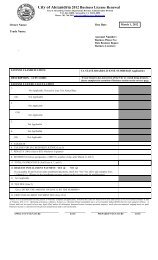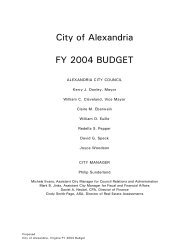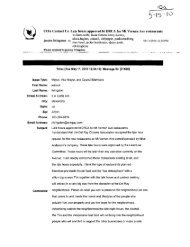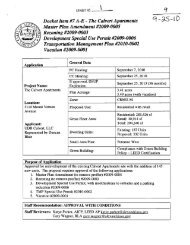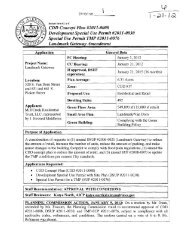LOYALISM IN EIGHTEENTH CENTURY ... - City of Alexandria
LOYALISM IN EIGHTEENTH CENTURY ... - City of Alexandria
LOYALISM IN EIGHTEENTH CENTURY ... - City of Alexandria
Create successful ePaper yourself
Turn your PDF publications into a flip-book with our unique Google optimized e-Paper software.
families factored prominently in the<br />
development <strong>of</strong> the town, and they steered the<br />
town through the tumultuous events <strong>of</strong> the<br />
1770s.<br />
Parliament’s passage <strong>of</strong> the Stamp Act<br />
on March 22, 1765 marked the onset <strong>of</strong><br />
<strong>Alexandria</strong>’s opposition to British policies. The<br />
act required that almost every kind <strong>of</strong> paper<br />
document (i.e. newspapers, court orders, deeds,<br />
wills, cards) had to have a revenue stamp, the<br />
proceeds <strong>of</strong> which went to the British<br />
government. The colonists reacted to this act<br />
with civil disobedience and a refusal to accept<br />
the revenue stamps. Virginia was the first<br />
colony to <strong>of</strong>ficially oppose the Stamp Act, when<br />
its House <strong>of</strong> Burgesses agreed upon the Stamp<br />
Act Resolves in June <strong>of</strong> 1765. According to<br />
Thomas Pressier, “all indications are that the<br />
merchant community <strong>of</strong> <strong>Alexandria</strong> solidly<br />
endorsed the movement to defeat the act.” The<br />
Stamp Act crisis motivated <strong>Alexandria</strong> resident<br />
George Mason to take an active role. Mason<br />
realized that since the courts were closed,<br />
landlords would be unable to take tenants to<br />
court for nonpayment <strong>of</strong> land rentals. On<br />
December 23, 1765, Mason drafted and sent to<br />
George Washington, <strong>Alexandria</strong>’s delegate to<br />
the House <strong>of</strong> Burgesses, a “Scheme for<br />
Replevying Goods and Distress for Rent,”<br />
which provided landlords with a way to collect<br />
rent from tenants without using a stamped legal<br />
document. After the repeal <strong>of</strong> the Stamp Act on<br />
March 4, 1766, Mason’s scheme became<br />
unnecessary, but it serves as evidence that<br />
Mason was active in early resistance to British<br />
policy. After the repeal, it was clear in the<br />
minds <strong>of</strong> most Virginians and other colonists<br />
3<br />
that Parliament could not tax them without their<br />
consent.<br />
The passage <strong>of</strong> the Townsend Duties by<br />
Britain in 1767 again pushed <strong>Alexandria</strong>ns into<br />
action. The Townsend Duties placed taxes on<br />
various goods imported to the colonies from<br />
Britain, like lead, paint, paper, and tea. The<br />
colonies responded with resistance, and began<br />
to set up Non-Importation Associations, spurred<br />
on by Samuel Adams’ circular letter in 1768.<br />
<strong>Alexandria</strong> followed suit and sent George<br />
Washington to the meeting <strong>of</strong> the House <strong>of</strong><br />
Burgesses with the Fairfax County Resolves,<br />
which promised the non-importation <strong>of</strong> British<br />
goods. George Mason and George Washington<br />
played a major role in the creation <strong>of</strong> the<br />
Resolves. They both received copies <strong>of</strong> the<br />
Non-Importation Associations declarations that<br />
were drafted in Philadelphia and Annapolis in<br />
early 1769. On April 5, 1769, the two men<br />
exchanged letters regarding the Associations.<br />
Mason sent Washington some changes to the<br />
Associations on April 23, 1769, and<br />
Washington added the changes to the draft that<br />
he took with him to Williamsburg. Before<br />
Washington could present the draft, Governor<br />
Botetourt dissolved the House <strong>of</strong> Burgesses, but<br />
the men un<strong>of</strong>ficially continued the meeting at<br />
Raleigh Tavern. Washington served on the<br />
committee to draft the agreement, which closely<br />
resembled the draft he and Mason had<br />
developed. <strong>Alexandria</strong> had taken a firm stance<br />
<strong>of</strong> resistance, by agreeing not to import British<br />
goods until the situation changed. George<br />
Mason and George Washington asserted their<br />
role as leaders <strong>of</strong> <strong>Alexandria</strong>’s political<br />
involvement.


